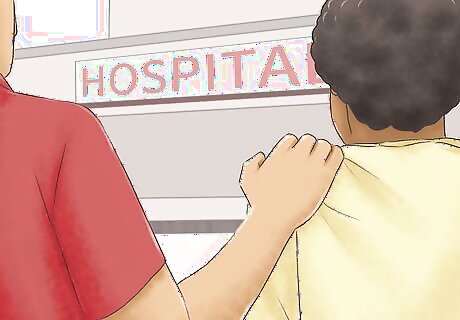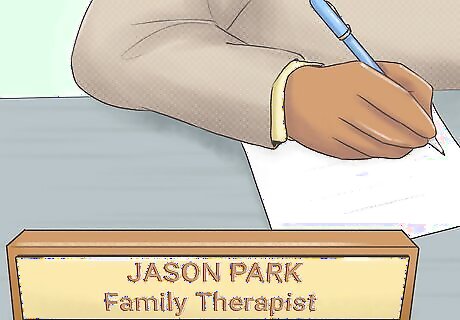
views
X
Research source
Contemplating suicide is a big deal for a teen, and a scary situation for parents. When dealing with a suicidal teen, remain calm and remember that you can handle this.
Looking for Warning Signs

Notice any signs of depression. Depression correlates highly with a risk of suicide. Symptoms of depression should be taken seriously. Be on the lookout for the following symptoms associated with depression: Apathy Excessive guilt Sadness Hopelessness Social withdrawal Loss of energy Difficulty concentrating Memory loss

Observe changes in behavior. A sudden change in behavior can indicate thoughts of suicide, especially if the behavioral changes are dramatically different than normal. Behavior changes can include: Decreased school/work performance Decreased time devoted to social relationships Decreased involvement in activities such as sports or hobbies Increased irritability Anxiety Exhaustion Erratic behaviors (such as drug use or dangerous activities) Self-harming (such as cutting)

Notice sleep disturbances. If your child can’t seem to get out of bed all day, or if your child has stopped sleeping, these are concerns. Sometimes teens have a different sleeping schedule than adults or children, preferring to stay up late, but be conscious of what your teen does if they stay up late and whether the activities are positive.

Observe changes in eating habits. This can include loss of appetite, or overeating. Both overeating and undereating can indicate problems with mental health. Assess when the changes began to occur, and if any other changes occurred around the same time.

Notice if your child exhibits any risk factors. Risk factors are any associations that can contribute to an increased risk of teen suicide. Common risk factors include: Previous suicide attempts History of mental health diagnosis (having Schizophrenia, Depression, Anxiety, Bipolar Disorder) Alcohol or other substance use Aggressive behavior Recent/serious loss (death, parents' divorce, broken romantic relationship) Confusion or lack of support with discovering sexual identity Being bullied or being a bully Family history of suicide Family history of domestic violence
Managing a Crisis Situation

Take suicidal threats seriously. Don't brush off any suicidal threat. In some instances, the threat of suicide is a cry for help, one way of saying "I don't know how to cope". If ignored, the teen may choose to act on the impulse. It is better to err on the side of caution when dealing with a human's life.

Approach the teen calmly. If they are actively threatening, crying, pacing, and/or yelling, try talking to the teenager in a very caring, calm tone. You do not want to escalate the situation. Be conscious of staying calm, and try to de-escalate the teen to feel calm as well.

Talk with the teen. Ask your teen to talk about what is going on and what feelings they are experiencing. Don't be afraid to use the word suicide. Listen closely and don't interrupt; let your teen express all they have to say. Don't dismiss their problems or get angry, it's their time to talk. Let them express the negativity they are feeling. Ask them what they need in their life that will help them keep living. Remind them of the positive things that they have in their life, or events coming up that they can look forward to experiencing. Tell them that their life matters to many people. Remind the teen that they are loved and supported, and that you will be there for them. DON'T blame your teen or make any accusations. This is your turn to listen and refrain from judgment. Be supportive. The teen's safety is the first priority.

Ask the teen if they have a suicide plan. A plan is the way that they want to carry out the suicide. If the teen has plan, follow up with asking if they have the means to carry out the plan (pills, gun, etc). Then ask when the teen intends to carry out the suicide, and finally, ask if they truly intend to follow through on the suicide.

Assess suicidality risk. After asking questions about intent, plan, and means, assess the teen's risk of dying by suicide: Low – Expresses some suicidal thoughts, does not have a suicide plan. Says they won't take their life . Moderate – Expresses suicidal thoughts. Has a vague plan that isn't very lethal. Says they won't take their life. High – Expresses suicidal thoughts. Has a specific plan that is lethal. Says they will take their life. Severe – Expresses suicidal thoughts. Has a specific plan that is lethal. Says they intend to take their life.

Call emergency services. If you determine that the threat is serious and their life is at risk, do not hesitate to call emergency services. Especially if they are admitting they are suicidal, they may need more help then you can give them at home.You can drive the teen to the Emergency Room, or if they are uncooperative, request an ambulance.

Go to the hospital with your teenager. A hospital provides a safe environment that can monitor your teen and give any immediate care they may need. Medical and mental health professionals will work with them to feel better. The hospital can and will keep them safe and de-escalate the situation.

Follow up on the psychiatric plan. Most hospitals will help the teen create a plan to deal with suicidal feelings in the future, and ways to cope now. Be clear on discharge instructions and follow through with hospital orders. It is common to refer back to the teen's physician or to a mental health worker for follow-up continued care.
Preventing Future Suicide Attempts

Store firearms safely. The risk of suicide increases dramatically when teens have access to firearms at home, and nearly 60% of all suicides in the United States happen with a gun. Safely keep all guns in the home unloaded, locked, and kept out of the reach of children and teens.

Hide alcohol, knives, and medications. Access to means can increase the risk of teen suicide. Keep alcohol, knives, and any potentially lethal medications locked away if you are concerned about your teen using them as a means for suicide. Use a lock on a cabinet in the kitchen for alcohol and knives, and use a safety deposit box for medications.

Engage in treatment. Seek out a therapist to help your teen learn coping skills for depression and thoughts of suicide. Family therapy can be helpful so that family members can understand the teen's feelings and how to support the teen in the future. Some teens may start taking medications, which can be prescribed and monitored through a psychiatrist.



















Comments
0 comment